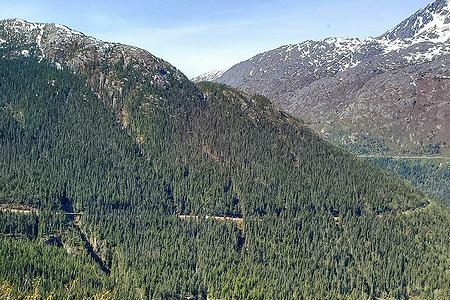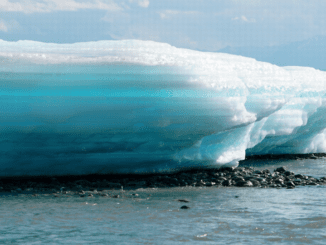
WASHINGTON, DC, October 28, 2020 (ENS) – President Donald Trump’s administration has finalized plans to reverse roadless protections for the Tongass National Forest in southeast Alaska that have been in place for nearly 20 years. On Wednesday, the U.S. Department of Agriculture released its final rule exempting the Tongass National Forest from the 2001 Roadless Rule, opening up 9.4 million acres of the largest old-growth temperate rainforest in North America to logging, roadbuilding, and further development.
In announcing its decision, the U.S. Forest Service defined the extent of the logging and roadbuilding that will be permitted. “Although 9.4 million acres would no longer be subject to the 2001 Roadless Rule with the final rule, only 186,000 more acres would become available for timber production,” the agency said, adding that, “road construction is estimated to increase Tongass-wide from 994 miles in the no-action alternative to 1,043 miles in the final rule over the next 100 years.”

The announcement was not a surprise, as the USDA last month, in an environmental review, had already signaled its plans to exempt the Tongass National Forest from the Roadless Rule passed in 2001 during the Clinton administration.
In announcing its decision, the USDA Forest Service defined the extent of the logging and roadbuilding that will be permitted. “Although 9.4 million acres would no longer be subject to the 2001 Roadless Rule with the final rule, only 186,000 more acres would become available for timber production,” the agency said, adding, “road construction is estimated to increase Tongass-wide from 994 miles in the no-action alternative to 1,043 miles in the final rule over the next 100 years.”
Environmental organizations were quick to slam the move, pointing out that 96 percent of public comments on this issue were in support of keeping the Roadless Rule in the Tongass.
Western Values Project Director Jayson O’Neill said, “This decision cemented Trump’s legacy as the worst public lands president in U.S. history, period. The list of destructive decisions by this administration is long, but between illegally eviscerating America’s national monuments to now opening the Tongass to industrial logging, no other president has unilaterally removed more protections for America’s cherished public lands than Trump.”
“This is truly a reflection of the corrupt special interest influence driving decisions within Trump’s administration that are not only wrong but also wildly outside of what Americans want and value,” O’Neill declared.
Tongass Logging Endangers the Climate
Earthjustice, a nonprofit national public interest law firm based in Washington, DC, points out that in Alaska, which had unprecedented heatwaves this summer, the Tongass stands as a buffer against climate change, saying, “Much like the Amazon rainforest, the Tongass’ stands of ancient trees are champions at absorbing greenhouse gas emissions, storing approximately eight percent of the total carbon in all national forests of the lower 48 states.”
The Tongass Rainforest of Alaska – the traditional homelands of the Tlingit, Haida, and Tsimshian Peoples – has been called ‘the nation’s climate forest’ due to its unsurpassed ability to sequester carbon and mitigate climate impacts.
Besides serving as a refuge for salmon, birds, and other wildlife, the 2001 Roadless Rule protections extended to cultural and sacred sites of great importance to Alaska Native people, who rely upon the Tongass for spiritual and subsistence practices.

Osprey Orielle Lake, executive director of the nonprofit Women’s Earth and Climate Action Network, WECAN, said, “The world’s largest remaining intact temperate rainforest containing vital old-growth trees is under attack because of efforts to undo the Roadless Rule.”
“For decades, industrial-scale logging has been destroying this precious ecosystem and disrupting the life-ways of the region’s Indigenous peoples and local communities,” said Lake. “We stand with Indigenous peoples, Southeast Alaskans, and allies nationally and internationally to say no to further old-growth logging, and yes to maintaining the current Roadless Rule. Our national forests are essential lungs of the Earth.”
The Wilderness Society, a national nonprofit group, points to the great natural resource values of this old-growth forest, saying on its website, “The waterways of Tongass National Forest produce a huge number of pink, sockeye, coho and king salmon that help sustain local fishing communities. In fact, one-quarter of the entire West Coast’s annual commercial salmon harvest comes from the Tongass.”
Due to 19 years of the Roadless Rule, the Tongass National Forest is more intact and less damaged by human activity than elsewhere in the Pacific Northwest. But, The Wilderness Society says, “It’s easy to see how cutting Roadless Rule protections could ruin that: roads introduce harmful erosion and disrupt the passage of salmon, while logging robs fish populations of trees that offer cooling shade in the summer, warming shelter in the winter and a stabilizing root system that acts as a hedge against flooding.”
Taxpayers Lose Money Logging the Tongass
The timber industry today accounts for only about one percent of Southeast Alaska’s jobs. The Wilderness Society cites analyses that suggest logging of roadless areas in the Tongass is not in the taxpayers’ interest, as “the Forest Service typically makes back less than a dime for every dollar spent on selling the forest’s old-growth trees.”
Over the last two decades, the U.S. Forest Service, USFS, lost several hundred million dollars on timber sales in the Tongass National Forest, according to an October 2019 report by Taxpayers for Common Sense, a nonprofit, nonpartisan federal budget watchdog organization based in Washington, DC.
Their analysis came as the Trump administration made its decision to open the Tongass to logging.
The report, “Cutting Our Losses: Twenty Years of Money-Losing Timber Sales in the Tongass” examines two decades of timber sales and their fiscal return for federal taxpayers. The report finds that, in total, federal taxpayers have lost $600 million since 1999.
“It is outrageous that taxpayers don’t earn a profit selling the timber from our national forests – timber that all U.S. taxpayers own,” said Ms. Ryan Alexander, president of Taxpayers for Common Sense. “Worse yet, it actually costs taxpayers millions to ‘sell’ our timber. That doesn’t make sense.”
Alaska Wanted the Rule Removed
The Roadless Rule was originally established in the final days of Bill Clinton’s presidency. It banned logging and road construction on roughly 58 million acres of national forest lands across the country, including vast areas of the Tongass National Forest.

Alaska’s elected leaders have long claimed that the rule has harmed the state’s timber industry and made it harder to develop mining and energy projects in southeast Alaska.
The decision to lift the Roadless Rule was made in response to a 2018 petition to U.S. Agriculture Secretary Sonny Perdue from the administration of former Alaska Governor Bill Walker, an Independent.
Alaska Governor Mike Dunleavy, a Republican, was pleased with the Trump administration’s decision. “It is immensely gratifying to see the Trump administration act on what I and four previous governors have so long argued: Alaska is a unique land whose potential for our state and nation can best be realized only when we’re free from the unthinking application of one-size-fits-all national rules, in violation of the Alaska National Interest Lands Conservation Act and the Tongass Timber Reform Act.”
Senator Lisa Murkowski, an Alaska Republican who chairs the Senate Energy and Natural Resources Committee, said, “A full exemption from the Roadless Rule means access to more affordable and renewable energy to power homes and schools, access to technology at a time when more Americans are logging online for health care and education, and access for transportation and recreation to promote jobs and economic activity in the region – all while ensuring continued good stewardship of our lands and waters. I thank the USDA and Forest Service team for recognizing that one-size-fits-all federal policies are not appropriate in Alaska, and sometimes simply do not fit at all.”
Copyright Environment News Service (ENS) 2020. All rights reserved.
© 2020, Environment News Service. All rights reserved. Content may be quoted only with proper attribution and a direct link to the original article. Full reproduction is prohibited.



